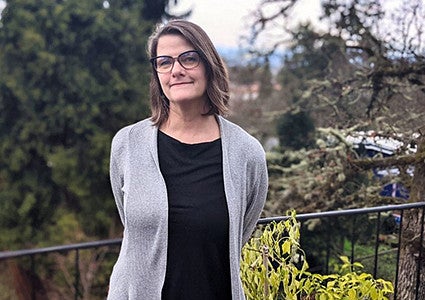
Sometimes life can take you in unexpected directions.
That was the case for Betty Campbell-Ross, MS ‘15 Communication Disorders & Sciences. A veteran with twenty years of service in the National Guard, she happened upon a news story on National Public Radio featuring speech-language-pathologists helping veteran patients with traumatic brain injuries. That radio program inspired her to explore becoming a speech-language-pathologist and eventually led her to the College of Education.
Betty was working in the mortgage industry when she decided to return to school. Taking postbaccalaureate courses at Portland State University to prepare for applying to communication disorders programs, she wasn’t sure if she’d be able to take on the rigorous coursework the master’s program required.
Her first course was statistics. Betty thought, “if I can do statistics, if I can pass this, then I’m going to keep going.” When she passed this first hurdle, she continued to excel in the remaining courses and decided to apply to graduate programs all over the country. One of her professors at PSU had spoken glowingly of McKay Sohlberg, PhD, a professor known internationally for her pioneering work in the field of cognitive rehabilitation.
“When I was applying for grad schools, I threw my net wide, because I worried that nobody would want to accept me. I was accepted into four schools, but McKay was the deciding factor for why I chose the UO.” McKay said of Betty, “I was fortunate enough to supervise Betty in our clinic seeing clients with brain injury. The commitment and passion that she brought to learning all that she could in order to help clients integrate into their communities as fully as possible inspired and motivated faculty and peers.”
Betty relied on the support of numerous mentors throughout her educational and professional careers, including Rik Lemoncello, PhD, Kerry Mandulak, PhD, Elise Peltier, Holly Shepard, and Pam Tennant, her supervisors in her externships at the Veterans Affairs Health System in Roseburg and in the 4J School District, respectively, and Leandra Gambee, NP at area skilled nursing facilities.
Her advice to COE students? Get a mentor. “Find somebody who has your back. There are times when graduate school can be discouraging. Find that person who will support you and help you realize that you can get through it.” She also credited her time in the National Guard as pivotal to making it through graduate school. “There were difficult days, but I knew that I would end up stronger. I realized that I could accomplish things that I never thought I could do.” Betty came full circle when she worked with veterans with traumatic brain injury at the VA in Roseburg during her externship there. Her military service became a bridge to veterans who were reluctant to receive treatment. “The veterans would be more receptive when they found out about my service. They didn’t expect to see that their therapist had military experience. Older veterans at the VA weren’t accustomed to seeing women in the service.” Betty grew up in a military family; her father was in the Navy, and she fondly remembers visits to the American Legion. She said that her travels while in the National Guard also helped her to be respectful of other cultures.
As Betty embarked upon her career, she found that the CDS Program’s emphasis on evidence-based practice served her well. “When first entering my career, I would get pushback when I didn’t do things the way my predecessors did. The CDS Program helped me use evidence to back up my methods.” Betty is now an independent contractor at Eugene Speech Therapy, where she works primarily with patients with dysphagia, aphasia, and cognitive deficits. She is proudest of her track record transitioning 98% of her patients from tube feeding to eating by mouth. When asked whether she made the right decision to change her career path, she didn’t hesitate. “It was the best decision I’ve ever made. I’m making a difference in somebody’s life.”
—By Celeste Christie, College of Education
